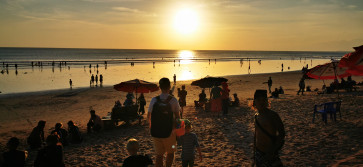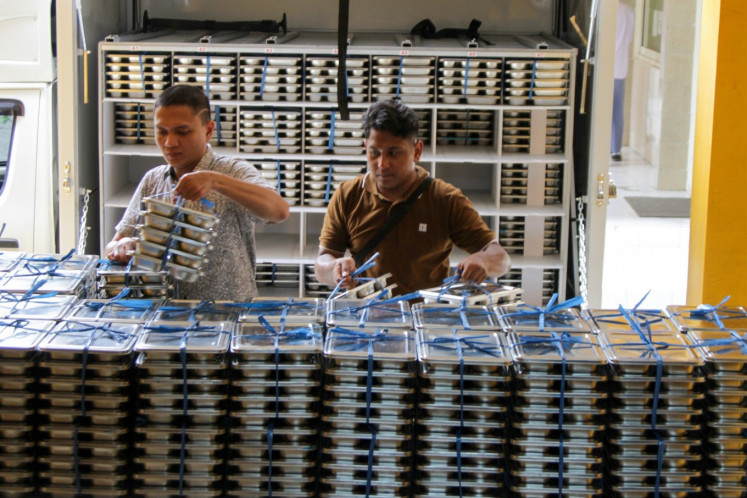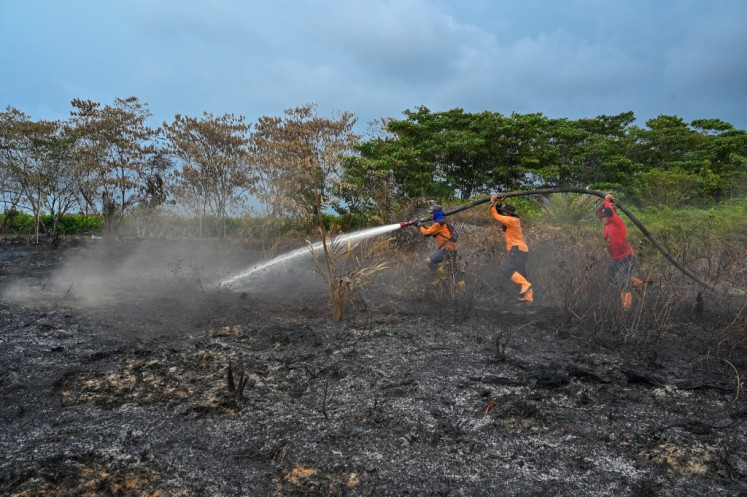Editorial: `Selamat datang', Pak Kevin
Although there are no welcome banners for Kevin Rudd on the road from the airport to Jakarta, many in Indonesia are pleased to welcome the Australian prime minister today
Change text size
Gift Premium Articles
to Anyone

Although there are no welcome banners for Kevin Rudd on the road from the airport to Jakarta, many in Indonesia are pleased to welcome the Australian prime minister today. Selamat datang Pak Kevin, as the traditional Indonesian greeting to welcome guests says. Although this is an official visit, please excuse the informality of addressing you on a first-name basis. We want you to feel comfortable, at home, for the next three days.
In the short time he has been prime minister, Rudd's track record has been nothing short of impressive. He came to the Bali climate change conference to sign the Kyoto Protocol, committing Australia to the fight against global warming; he broke new grounds at home by extending a long overdue apology from the state to indigenous Australians; he began withdrawing Australian soldiers from Iraq in a war Indonesia never supported; he pushed for the reintroduction of the teaching of Bahasa Indonesia in Australian schools; and last week, he broached the idea of an Asia-Pacific community.
The new Australian prime minister seems like a decent person we can work with. We are bound to have our differences. After all, we are talking about two giant neighboring countries who could not be more different in terms of historical paths and cultural backgrounds. But as the experience of the last 10 years shows, these differences don't stand in the path of warmer and more cordial relations.
We can ignore critics who say Rudd's idea of Asian policy is built around Australia's relationship with China. Just because he made China his first stop on his inaugural Asian tour should not be interpreted as lack of concern for the rest of the continent. At any rate, all countries in the region, including Indonesia, have been expanding and strengthening relations with China. This is an inevitable consequence of the rapid rise of China, whereby each one of us is trying to make up for lost ground after years of virtually dormant relations.
Some diplomats in Jakarta and Tokyo may interpret the move as a sign Canberra considers their countries less important than China, but the reality is Australia remains one of the most important countries in the region. And now Rudd is here, we have to make the most from his visit.
We fully support the idea he shared in an article in Kompas yesterday, that while in Jakarta he wanted to look ahead. Indeed, it would be too easy and tempting to look back because it is interesting (certainly to talk about), given the ups and downs of our relations in the past. But what is the point of it all, when we have so much to discuss and do together?
There is the question of regional security following the signing of the Lombok treaty, including ways of dealing with the threat of terrorism. There is the discussion of formalizing a free trade agreement that should pave the way for more trade and investment. There is the climate change issue and ways to tackle it together. There is a whole range of issues to discuss and work out together that should keep Indonesia and Australia occupied for the next few years and decades.
We can take comfort in the fact our relations are now easier to manage than 10 years ago, when a single issue, namely East Timor, often brought to a halt all other issues in bilateral talks. Since then, we continue to have the occasional sticking point -- the controversy over Papuan asylum seekers, the imprisonment of Australians in Indonesia for drug-related offenses -- but these problems, put in the proper perspective, do not undermine the relationship on other fronts.
We should also take comfort in the fact that increasingly, we share the same values on issues such as democracy, freedom and human rights, as well as the need for a peaceful, secure and stable region. In the past, our relations were hampered or strained by the grossly overstated need for cultural sensitivity. Culturally we are still different, but we have a lot more in common than we often care to admit.
The designation of Indonesia as a "normal country" by a recent study in Australia may offend some people here (did they think we were abnormal? Weird? Or how about freakish? We're no less special than you?). But there is some truth in this which could help guide the way we conduct our relationship. Australia, as the book suggests, should treat Indonesia like any large democratic and developing country such as India or Brazil.
Inevitably, ties between the two countries are also determined by how good or bad the relations between the leaders are. Rudd's predecessor John Howard succeeded in forging a good rapport with President Susilo Bambang Yudhoyono. They were at ease with each other, were on a first-name basis and apparently called each other up. Of course, the Bali bombing and the Aceh tsunami brought the nations closer together and this eventually brought the two leaders even closer.
There is no reason why such a cordial relationship can't be forged between Yudhoyono and Rudd, even in the absence of tragedies. Both men have to give it a go. On that note, let's welcome the Australian prime minister in a way Yudhoyono might want to try: G'day Kev.









